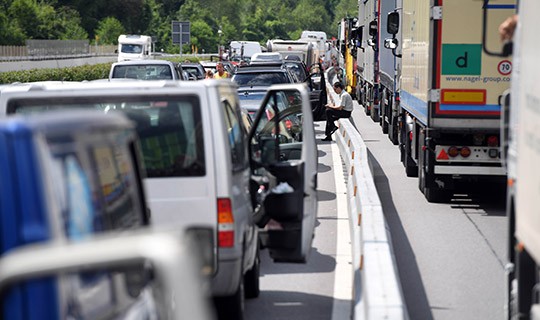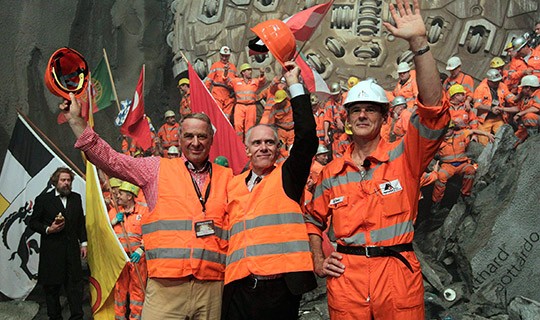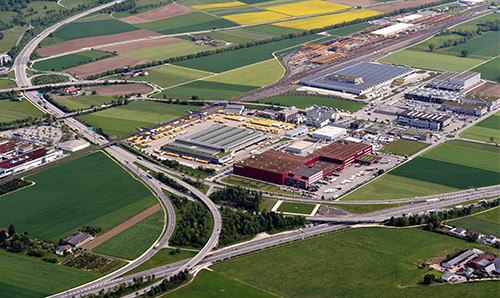
Head of Group Communications on Cargo sous terrain
"A privately funded multi-generational project"
Reducing truck traffic by half on motorways and a third in cities is the most striking effect of Cargo sous terrain, a subterranean mega conveyor belt for cargo across the country. Swisscom is also investing CHF 5 million in the project and will be providing technologies like 5G and the "Internet of Things". Stefan Nünlist – Head of Group Communications and Sustainability at Swisscom and member of the Board of Directors at Cargo sous terrain explains how.
Roger Baur, 23 January 2018
Stefan, does Swisscom have so much merchandise to ship it needs a nationwide underground network to do the job?
Swisscom alone, of course not. The project is spearheaded by major Swiss logistics companies charged with ensuring dispersion in the fast-changing world of the future. Swisscom operates several hundred Swisscom Shops across the country and Siroop is one of Switzerland's largest online shops. Delivering new smartphones, spare parts or gadgets to our customers is all in a day's work. However, this project is of interest to Swisscom for another reason: we can put our experience with the Internet of Things and running the best data communications to good use.

Cargo sous terrain will take the huge burden of heavy traffic away from motorways and cities. Will traffic jams become a thing of the past? Picture: Keystone
How can we picture it in our minds?
Cargo sous terrain is not an articulated train; it’s a subterranean conveyor belt like those at airports which automatically transport countless pieces of luggage from different check-in desks to the right planes at the right time. One of these days goods will be delivered to Egerkingen, transported by Cargo sous terrain to Zurich and then delivered to customers by electric vans. For this to work as quickly and smoothly as possible, we need electronic tracking, and with it a network that stays in constant touch with the goods, while at the same time also lifting and lowering cargo, steering it in the right direction. This is still a challenge today, especially underground, and in real time. In the future though, it will be easy with 5G, which will give business new impetus .I can well imagine Cargo sous terrain becoming the backbone of Swiss IT logistics. Our corporate business segment and subsidiary Cablex can contribute a wealth of valuable know-how in this respect.
"Swisscom will put its 5G network and experience with the Internet of Things to good use in the project."
What do you mean?
Suppose I want to buy new shoes in a shop in Olten, but unfortunately they don't stock my size. Swisscom is already helping shops by letting them say to the customer: we can send you the size you want to your home. That puts the shoe retailer on the same footing as online shopping giants. However, in the future the retailer will be able to say: I’ll order the right size from our main warehouse and in two hours they’ll be here. And that puts the shop at an advantage. This is just one example that can be applied to countless areas. Think of medicine or spare parts for outages at factories or other emergency repairs – this new generation of logistics can strengthen the economy of an entire country, while at the same time massively reducing the traffic on our roads, not to mention logistics costs and covering demand for smaller quantities of break bulk. That is why I regard it as a multi-generational project. And a privately financed one at that, because we receive no public funding.

Cargo sous terrain is a multi-generational project like NEAT. Former federal councillors Moritz Leuenberger and Adolf Ogi celebrate the final breakthrough of the Gotthard Base Tunnel. Picture: Keystone
It will take 25 years to reach final completion; that's a long time.
Yes, that’s exactly why it’s a multi-generational project. We can’t leave our children an ailing infrastructure and transport system on the brink of collapse. We need to lay the foundation now for a strong Switzerland of the future. Our grandparents did this by building railways, motorways and the Gotthard road tunnel, all of which generated prosperity. Our parents built Bahn 2000 [Rail 2000] and NEAT. And now it's our turn with projects like Cargo sous terrain and technologies as the basis for developing innovations.
What exactly might Switzerland be focusing on in 2045?
Energy and traffic are bound to be key issues. That's why Cargo sous terrain only uses renewable energies. Another topic that is already emerging is re-industrialisation. Yes, it's a fact: industry is bringing production back home, because digitisation lets us build things in a new way. It is no longer low-wage countries that have the advantage here but countries with excellent educational standards and infrastructure. Switzerland enjoys a pole position in this respect, but also faces tough competition from other highly developed countries. Locational decisions are being taken now, which is why we need a vision. In my view, Cargo sous terrain is a significant part of such a vision.
Cargo sous terrain: first section by 2030
The project is to be wholly funded by the private business sector. Currently this includes Migros, Coop, die Mobiliar, Swiss Post, SBB Cargo, BKW and Swisscom. Provided parliament creates the necessary legal framework by 2019, the first section should already go into operation between Niederbipp and Zurich in 2030. On reaching final completion by 2045 the Cargo sous terrain network will cover Geneva to St. Gallen, Basel to Lucerne and a branch from Bern to Thun. Goods will be conveyed underground along these lines from one of 80 feeder points to the others – delivered to their final destinations by environmentally friendly vehicles like electric vans.

Cargo sous terrain is due to go into operation at the Härkingen motorway junction in 2030. Picture: Keystone
5G: more than faster
The fifth generation of mobile communication not only offers higher speeds. For the first time it puts mobile access on the same footing as fixed line access. And not only in terms of speed, but also stability and response time. So, for the first time it will be possible to control machines via the mobile network, for digital production operations or connected mobility, for instance. 5G is therefore one of the key prerequisites for driverless cars to find their way on their own.

Swisscom is pushing ahead with the latest mobile generation in its "5G for Switzerland" programme.
Swisscom cloud: Swiss data cloud
Cloud services also play a key role in Cargo sous terrain. Data and software are not stored locally, but in central servers. Swisscom has been offering cloud services – based in Switzerland – for quite some time. This means that data is stored in Switzerland and therefore subject to national legislation and strict privacy regulations.